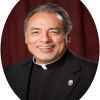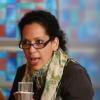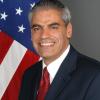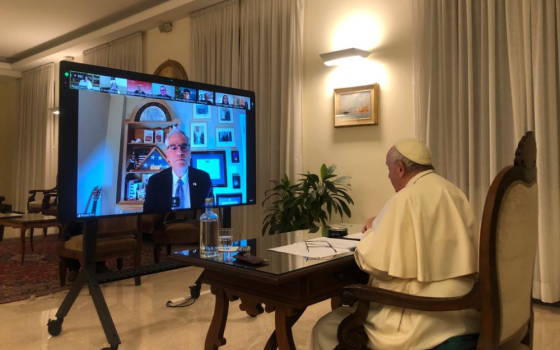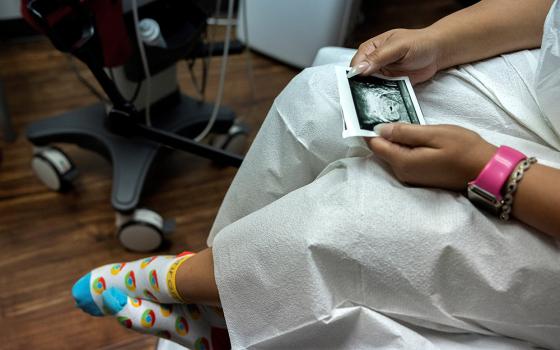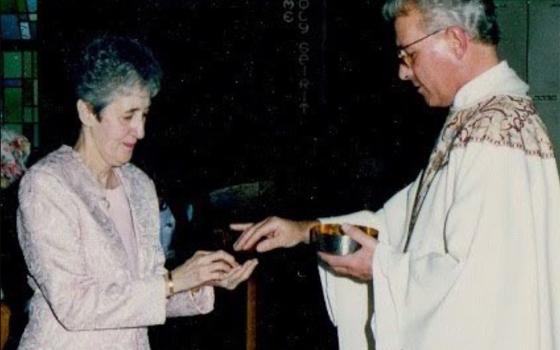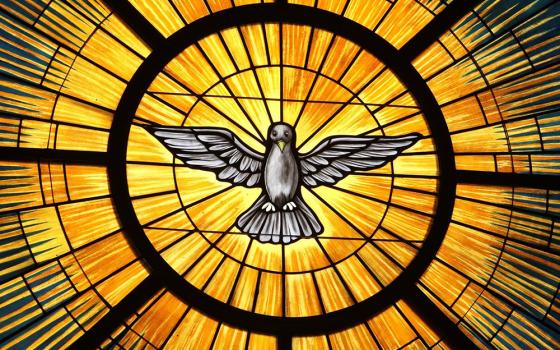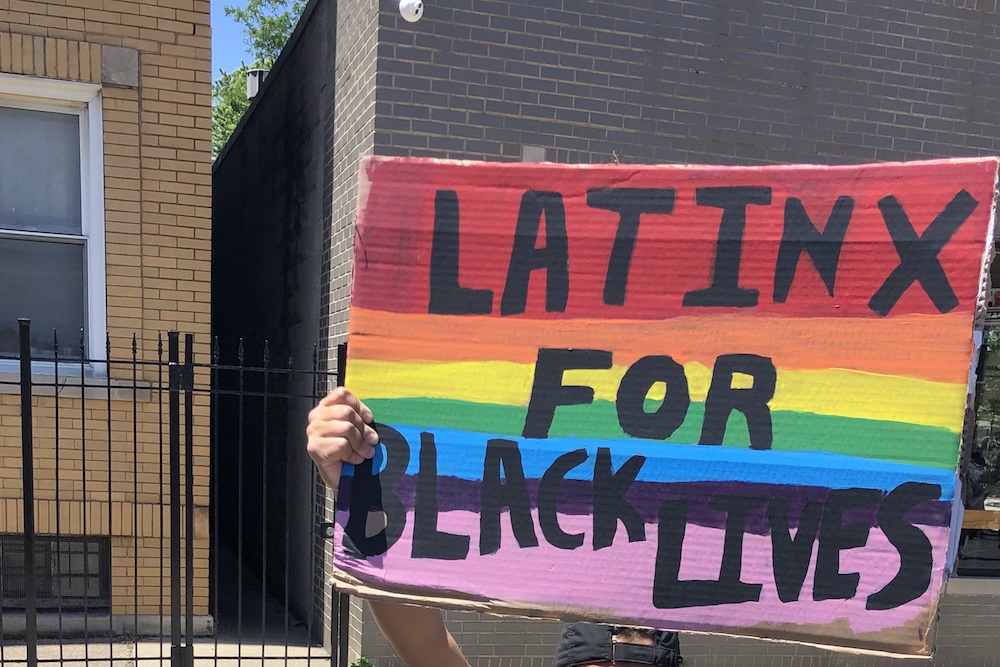
A person holds a rainbow colored sign reading "Latinx for Black lives" during a May 6 walk organized by Activate:Chi, a grassroots organization based in Chicago. (Courtesy of Miguel H. Diaz)
Once again, as the contributors to Theology en la Plaza, we choose to write en conjunto from Latin@ perspectives, distinct, yet united by a desire for convivencia. We write in deliberate solidarity with all who affirm — in word, deed and commitment — that Black Lives Matter. We write because the confluence of twin epidemics, COVID-19 and the ongoing plague of racism, place vulnerable communities at particular risk. Escribimos porque as Latin@s our communities are formed and shaped both by the richness of African diasporic roots and people as well as by anti-blackness that for too long remains under addressed en nuestra casa.
Beyond 'normal' to Jubilee
Before Memorial Day, many longed for a return to normal, to activities once taken for granted like work, shopping, eating out and visiting friends. This longing for a return to the familiar rhythms of daily life, however, could not erase the reality that the "old normal" is also about the horrifying causes of suffering for marginalized communities of color. This pandemic has exposed hard truths about our society that have long been ignored at the cost of the lives of those who are poor. COVID-19 is ravaging Hispanic, African-American and Native American communities whose people are dying at a disproportionately higher rate than whites.
The "old normal" is about economic inequalities that favor the rich and perpetuate poverty for the poor. It privileges violent racist policies that demonize persons as less than human, discriminatory immigration policies neglectful of people dying in detention centers, educational systems that perpetuate a distorted narrative about "American diversity" at the service of xenophobic ideologies. The "old normal" ignores inadequate health care systems that daily put the poor at risk of death, and supports unjust tax cuts that undermine health care centers that serve vulnerable indigent communities. In the "old normal," African Americans, Latinos and Native Americans are the first to suffer disgraces by racist persons, but also from the very institutions in our society set up to protect people of color.
The historic global protests in response to the murder of George Floyd challenge us to demand that moving forward must be about more than a "new normal," it must be about justice! This justice begins by listening to the struggles of those disenfranchised by poverty, by exclusion.
Buildings on fire in Minneapolis May 28 (Courtesy of Ana I. Díaz)
Profound transformation in our society requires sustained solidarity and action in response to those suffering from centuries of systemic racial injustices. The cries of the poor and marginalized call us to begin a Jubilee era in which the poor and excluded are leaders and agents in dismantling a society built on oppression, racism, inequality and violence.
It is time to repent and rebuild. We need to stand up to the inhumane racists policies that decide who lives and who dies. Prioritizing an economy in which Black Lives Matter, in which the Poor Matter, is grounded in a preferential option for and with the poor and vulnerable articulated in our Catholic social teaching.
It is time to be bold, to invest in a better future that rectifies the damage caused by centuries of racism and suffering and that honors the dignity of all. Concretely, this requires a commitment to ensure a quality of life that protects human rights; that guarantees access to food, shelter, healthcare, employment, higher education without the burden of heavy debt; that secures a right to a life without fear of violence because of the color of one's skin.
To begin a Jubilee era, we must condemn and resist racism and dismantle white supremacy in all of its manifestations, in our society and in our churches. To bring healing to a racially divided nation, Christian churches must offer prophetic leadership to honestly deal with the privileging of whiteness that plagues our own structures, practices and relationships. Only then, together, can we bring hate to its knees and invite all to share at a table graced by justice and peace.
—Arturo Bañuelas
The perils of unexamined civil order
The Christian story has had a complicated relationship with civil order. Society and its systems for organizing people toward a shared vision of the good — which includes laws and policing — are often seen as established by God for the benefit of the human family (for example, in the work of figures like St. Augustine and St. Aquinas). We often fail, however, to understand the ways that human sin corrupts these very structures.
Under the law, the Egyptian leaders enslaved the Hebrew peoples. Under the law, the Maccabees were set to be slaughtered for their faith. Under the law, Herod declared that all boys born within a certain time period would be slaughtered. And Jesus' crucifixion was rightful punishment for those considered enemies of the state under the law of the Roman Empire. Thomas Aquinas warned that people ought to be vigilant of the ways sin corrupts the body politic. When laws are unjust, oppressive, against the laws of the Creator, civic leaders can turn into tyrants. The Rev. Martin Luther King Jr.'s "Letter from a Birmingham Jail" carefully reviews this complicated relationship.
Black and Brown bodies suffer — even unto death — under the weight of oppressive laws and an unexamined trust in police order. In the Americas and globally, this is compounded by the weight and stench of slavery, which permeates social and religious imagination long after its abolition. Like an infection, the racism that is the inheritance of slavery in the U.S. and other countries leads to a convenient and willful ignorance as to the true harm inherent in many forms of policing and the laws that support it. Unexamined civil order is the legitimation of the concupiscent drive of the powerful, and of those who benefit from the status quo.
Following a crucified Christ, Christians ought to be the first to conscientiously examine the many ways laws and the civil order can serve to inflict harm on the bodies that society considers expendable or inconvenient, such as the elderly, the unborn, and Black and Brown lives. We must raise consciousness about a specific population whose very existence is threatened daily by these sins. Black and Brown transgender persons suffer a triple violence from the oldest sin in the Americas.
First, transgender bodies are the target of unparalleled gender-based violence. This targeting occurs for a variety of reasons, including transphobia and mistaken religious perceptions of their worth before God, generalized invisibility in their communities of origin, and the sinful dehumanization of LGBTQ+ persons in many communities and society overall.
Second, when they survive an attack on their bodies, Black and Brown transgender persons are weary of reporting the violence to the authorities, and often do not do so. This is due to the overwhelming homophobia and transphobia existing in the criminal justice system. Often, reports of violence against transgender persons are not investigated because of the perception that they are deserving of such violence, or were somehow at fault and assumed to have been aggressive or even engaged in a criminal act to begin with.
Finally, direct police violence against Black and Brown transgender persons, including harassment, sexual assault and deadly force, is a real threat to this population. At this time, consider how these particular Brown and Black lives are faring, amidst the chaos, amidst the violence, amidst the hate, amidst systemic racism embedded in the very structures that are supposed to protect our lives.
—M.T. Dávila
Advertisement
Calling out our own
The Book of Revelation speaks to persecution at the hands of the Roman imperial power from those that have lost their trust in earthly powers: "Sovereign Lord, holy and true, how long will it be before you judge and avenge our blood on the inhabitants of the earth?" (Revelation 6:9-10). These words resound loud and clear today as our country witnesses yet another blatant and racist act in the murder of George Floyd. His last words of desperation have moved millions to protest within the public square: "I can't breathe."
The litany of violence against Black and Brown bodies in this country seems endless. It includes those whose trauma is publicly known as well as those bodies that remain undocumented, those who have suffered and/or died unjustly, in silence, as a result of brutality at the hands of police or other public authorities and policies. In the United States, the long history of racist, sexist and heterosexist privilege is often expressed through the abuse of power, authority and policing. It is more complex and pervasive than most of us want to admit, including those of us who come from communities also marginalized in this country.
Forty years ago this May, Miami erupted in massive protests following the acquittal of police officers in the death of 33-year-old Black insurance executive Arthur McDuffie. McDuffie, a former Marine, ran a red light. He died from injuries sustained at the hands of officers who arrested him after a high-speed chase. Among the officers who beat him with their nightsticks and metal flashlights was Alex Marrero, a Cuban American. Marrero was charged with second-degree murder, though some suggested he received the heaviest charge because he was a minority.
The case of Marrero, who actively participated in the beating of McDuffie, and that of Tou Thao, the Hmong American officer who apparently remained silent and immobile despite pleas from Floyd, exemplify the pernicious impact of systemic racialized injustice that implicates even those of us othered because of our own racial and ethnic differences. Within existing dominant structures in the U.S., complicity or indifference means Black and Brown bodies will suffer, not only at the hands of white bodies, but at times, also at the hands of other equally marginalized bodies. As Latinx, we too need to examine how we have been desensitized to the effects of white privilege, and, in various degrees, have been forced to conform to what has been socially constructed as "normal" in our efforts to follow laws and orders, or even to "fit in." As Latinx, we, too, have to confront the racism in our own cultures, families and structures.
We are not only facing a pandemic that disproportionately kills Brown and Black bodies and forces us to socially distance. We are also facing a prolonged social illness that has distanced those in power from the social concerns of marginalized communities, and has been directly responsible for the ongoing loss of innocent lives. George Floyd's brother has asked this nation to stop all violence, which he believes deters from the pursuit of justice and will not bring his brother back.
At this time of unrest and soul searching, we need to ask — how will order be restored justly, and what needs to happen when we move beyond street protests? As the Rev. Martin Luther King Jr. reminded us from his cell in a Birmingham jail, complacency is the greatest stumbling block to achieving justice. As we move from complacency into a time of restorative justice, we must do so mindful of the wisdom he offered during this time of detention: "law and order exist for the purpose of establishing justice." Without justice, we cannot expect to build lasting peace.
—Miguel H. Díaz
Reading for discomfort
The narratives of our U.S. civil religion follow familiar tropes when it comes to our moral struggle with our original sin of racism. Periodically, the endless quest for reconciliation calls for the sacrifice of a Black martyr, heroic tales of white saviors, moments of shared purpose and, once the amnesia sets in, a return to business as usual. Counter-narratives tend to tarnish the martyr, preferably with tales of criminality, and point to destruction, mostly of property. As for the "saviors," they preserve the status quo of submerged white supremacy and restore order by any means necessary, fueled by ideologies of that "thin blue line."
We are nourished by a spirituality that feeds off such sacrifice. It is propped up by theologies that canonize undeserved suffering that in turn support dysfunctional human relations like racism in theory and practice. This strategy of racialized martyrdom is rooted in misinterpretations of the Gospels that place the burden of dismantling racism on its victims, giving rise to a perverse soteriology that fetishizes the abuse and violent suffering of the oppressed (Nanko-Fernández, "Turning Those Others' Cheeks," in Gods, Games, and Globalization, 239-240). Though there may be improvement after each round, the rotten core of systemic racism remains untouched. That is because, as theologian and ethicist Fr. Bryan Massingale repeatedly reminds us, there are benefits to participating in whiteness, and discomfort is too inconveniently uncomfortable.
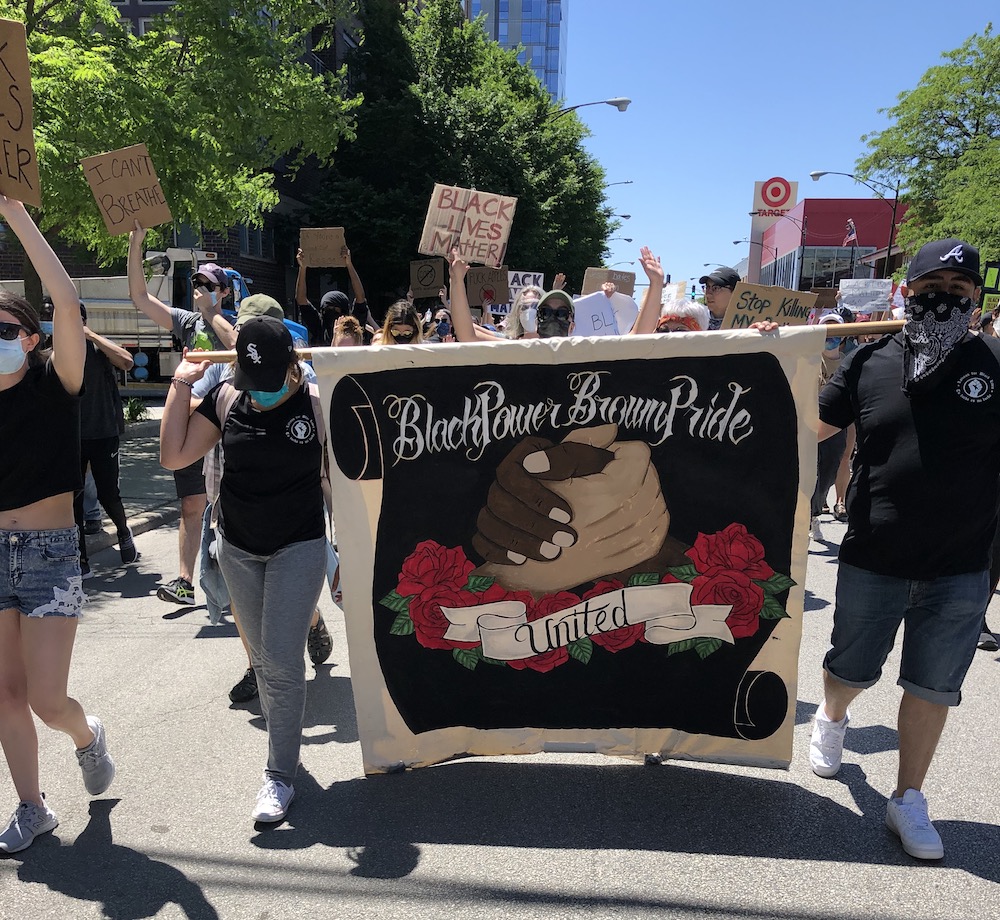
Over 30,000 protestors participate in a May 6 walk organized by Activate:Chi, a grassroots organization group based in Chicago. (Courtesy of Miguel H. Díaz)
Resistance begins with discomfort. Afro-Chicano poet John Murillo understands writing as a means of bearing witness in ways that push against the comfort levels of readers. So take up and read, tolle lege, in order to be traditioned and transformed by such witness. Tolle lege is the imperative that set in motion the conversion of St. Augustine, as recorded in his Confessions.
The temptation to socially distance from discomfort drives distinctions that disavow the complex relationship between peaceful protests and so-called riots. Murillo turns a glaring spotlight on the vicious cycle set in motion by institutionally sanctioned violence rooted in racism in his haunting poem, "A Refusal to Mourn the Deaths, By Gunfire, of Three Men in Brooklyn."
A child
we'll march about, who'll grace our placards, say,
then be forgotten like a trampled pamphlet. What
I want, I'm not supposed to. Payback.— in Murillo, Kontemporary Amerikan Poetry
This reflection on police-community relations is burdened by the weight of uprisings and responses to police killings of unarmed Black and Latinx people from Los Angeles in 1992 through 2014. Six years ago, and here we still are: George Floyd, Breanna Taylor, David McAtee, Maurice Gordon, Sean Monterrosa, Willie McCoy … Tolle lege!
Remember that five years ago this month, Donald Trump announced his campaign for the presidency in a rambling speech filled with images of dominance and hateful language: "When Mexico sends its people, they're not sending their best. … They're bringing crime. … They're rapists." How does this memory not make Catholics uncomfortable today? We knew then what the future would hold. Tolle lege!
Before he died, George Floyd called out for his mother, as writer Lonnae O'Neal reminds us in her poignant essay in The Undefeated. The discomfort of viewing yet "another police snuff film" as a Black mother of Black sons obliges her to bear witness as a response to a "sacred charge." O'Neal's theological wisdom is profound: "To call out to his mother is to be known to his maker." Tolle lege!
Transformation is the work of the Holy Spirit as dis-comforter and animator for justice. This is evident in the experience of the Holy Spirit in the life and struggles of the Black community, as underscored by womanist theologian C. Vanessa White. She notes how numerous references can be found in African American spirituals and sermons that affirm the power of this presence of God. White further preaches that "the Pentecost event was experienced by people of many races and ethnicities during difficult times," not unlike the protests over the past two weeks. Tolle lege!
Historically and in times of trauma, writing and reading have been perceived as resistant and subversive acts, so much so that dominant powers have sought to control access to these activities. Let us take up and read the words and narratives and commentaries from the edges. Then, with comfort disturbed, perhaps together we can birth a new day and new ways of being. We cannot afford to sacrifice any more martyrs.
—Carmen M. Nanko-Fernández
[Msgr. Arturo J. Bañuelas is currently the pastor of St. Mark's Parish in the diocese of El Paso, Texas. MT Dávila is associate professor of the Practice, Religious and Theological Studies, Merrimack College. Miguel H. Díaz is the John Courtney Murray University Chair in Public Service at Loyola University in Chicago. Carmen M. Nanko-Fernández is professor of Hispanic theology and ministry, and director of the Hispanic Theology and Ministry Program at Catholic Theological Union (CTU) in Chicago.]
Editor's note: Don't miss Theology en la Plaza. We can send you an email alert every time a new article is posted. Sign up here.
